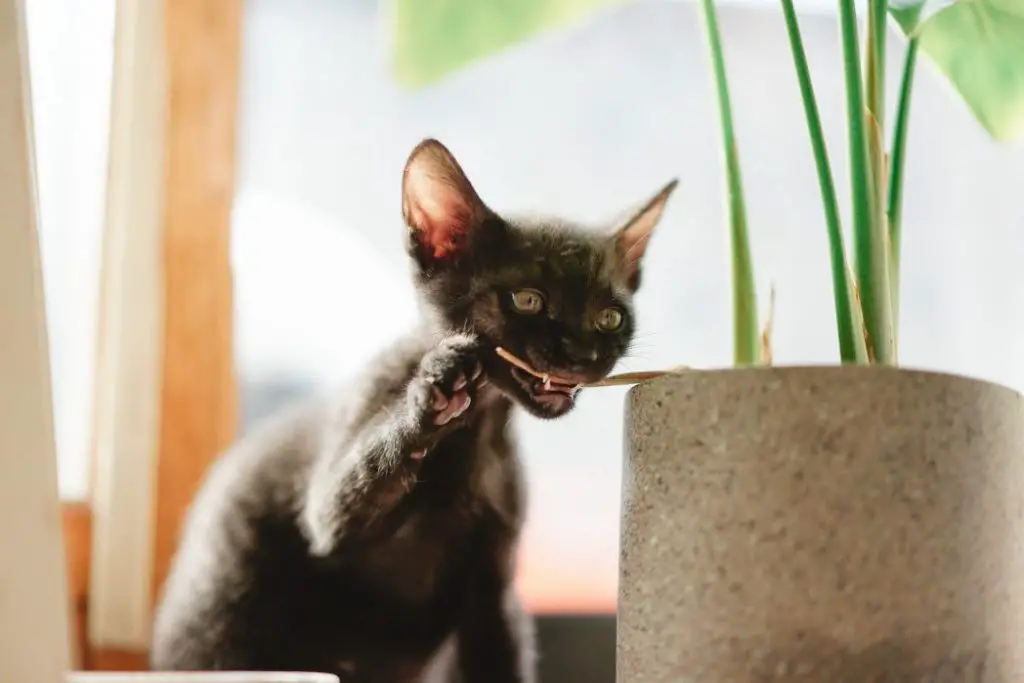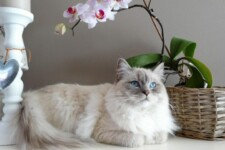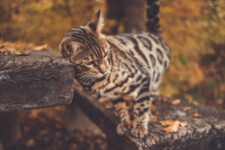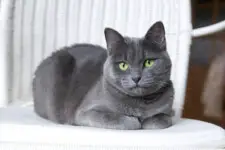Have You Heard Of Lykoi Cats? (Cute Little Warewolves!)
Also known as the werewolf cat, Lycan cat, Werecat breed, or the Wolf cat, the Lykoi cat is a rare breed that is still developing.
They are the only cat with a roan coat pattern, and their fur can either be fine or coarse.
With a distinguishing black/grey coat and a white color in the mix sometimes, the lykoi cat’s coat appears silver if there is more white.
Lykoi kittens are born completely black, and the color pattern appears in 2-4 weeks.
The Lykoi is not for everyone, but they can fit right into a loving home with people who are ready to give this cat a lot of playtime and attention.

The Origin
Lykoi cats are not as a result of interbreeding between known cat breeds, but an outcome of interbreeding between cats with a similar natural mutation. The first appearance of these werewolf looking cats was first documented in 2011 in the USA.
This breed came into being on its own, and is not recognized by many organizations such as the Cat Fanciers’ Association (CFA) because she was only discovered in recent years.
The Lykoi breed was first discovered by Britney Gobble, Johnny Gobble, and Patty Thomas – observing unique traits in some of the kittens they received.
They did not find any illness after running some tests on them.
They concluded that they were a natural breed with a different genetic composition. In 2016, the breed was recognized by The International Cat Association (TICA).
Physical Characteristics
This is an average-sized domestic cat that weighs between 3.5 kg to 7 kg and has a height of between 8-10 inches.
The female Lykoi cats are smaller than males.
They have a triangular-shaped face, a black nose, and big yellow eyes, which only intensify as they grow. Their bodies are a bit slender and come with a long neck.
The Lykoi is a partially hairless cat without a true undercoat. Some of their body parts, such as chin, eyes, behind the ears and the muzzle are often hairless.
Some of them are hairier than others, some Lykoi cats are almost bald, while others are almost entirely covered in fur.
It is peculiar that with such small amounts of hair, Lykoi cats shed so much hair that they nearly become bald.
After they molt, they regrow their hair, but sometimes their hair color changes from the original.
Suitable Feeding Options
Owing to the ongoing research on Lykoi cats, sticking to safe feeding options is a smart move. If possible, consult your veterinarian.
Go for already available quality feline food which is available in both dry and wet options. Wet food is the best since it contains much-needed moisture and natural proteins.
Home-made meals should be composed of at least 70% high quality protein sourced from natural sources.
It is wise to stick with a specific feeding regiment once you are satisfied with your choice.
However, if you need to change your cat’s diet, do it in moderation as a sudden change could cause digestion issues.
Caring tips
Lykoi cats prefer a clean environment, so to make your cat happy, make a point of keeping its surroundings clean, especially the litter box.
Check our reviews of a few recommended self-cleaning litter boxes
When litter training your Lykoi ensure that they can easily access the litter box, and also avoid clumping litter as it could lead to internal blockages, especially if ingested by a kitten.
Provide sufficient clean drinking water every day and always clean its water and food bowls before refilling.
Go for regular health check-ups and vaccinate your Lykoi cat. Frequent check-ups ensure that any illnesses are discovered and treated early.
Recommendations For Grooming
Lykoi cats are good at grooming themselves, so you won’t generally need to bathe your cat.
Conduct regular checks for wax and dirt build-up and brush the cat’s teeth often. Clean the ears using a moist clean and soft towel or a cotton bud.
Brush the coat regularly but gently, considering their delicate nature.
Brush in the direction of the hair growth using a soft brush once or twice a week. When your Lykoi is molting, then brush them daily.
Behavioral Traits And Personality
This intelligent breed can come with solutions for simple problems and enjoy learning new tricks, so keep your cat engaged by teaching them and involving them in interactive games.
Doing this helps to keep them stimulated and focused.
Do not expect your Lykoi to follow you around.
They are more likely that to spend time alone just observing their surroundings, especially if in the company of new people or a new environment.
Although they enjoy the company of humans, they also like being alone from time to time.
They are fond of playing games. Playing fetch with a Lykoi is fun since they learn fast. They are energetic cats who are often ready to switch from one game to the other.
Lykoi cats also enjoy the attention they get from humans, but they also interact well with other pets.
These loyal cats are also quite curious. They will explore every inch of the house until they have nothing new to observe.
Health Concerns
As stated earlier, research on the breed is ongoing, however these cats seem to enjoy a healthy life.
They will generally live for about 13-15 years, and taking good care of your cat boosts their chances of living longer.
Due to the scarcity of hair, Lykoi cats are susceptible to severe weather conditions such as hypothermia and sunburn.
Inbreeding is also a problem because there are so few of thee cats – genetic diseases can easily be passed.
Approximate Cost
If you are considering owning a Lykoi, be prepared to part with around $2000.
- Kittens usually go for an average of $2000.
- Blue kittens cost about $1500.
- Black roan will cost you around $2500.
- Black tuxedo kittens are approximately $1800.
Lykoi cats are a unique and a special breed. If you decide to have one, you will get a loyal and fun kitty.
See More Of Our Cat Breeds Series
Find Out About Calico Cats (The ‘Lucky Charm’)
Cute Ginger Tabby Cats (What Makes Them Special?)
All About Bengal Cats (Little Leopards)
Discover The Siberian Cat Breed (The Little Tiger)
Sources
https://www.petmd.com/cat/conditions/cardiovascular/c_ct_hypothermia



